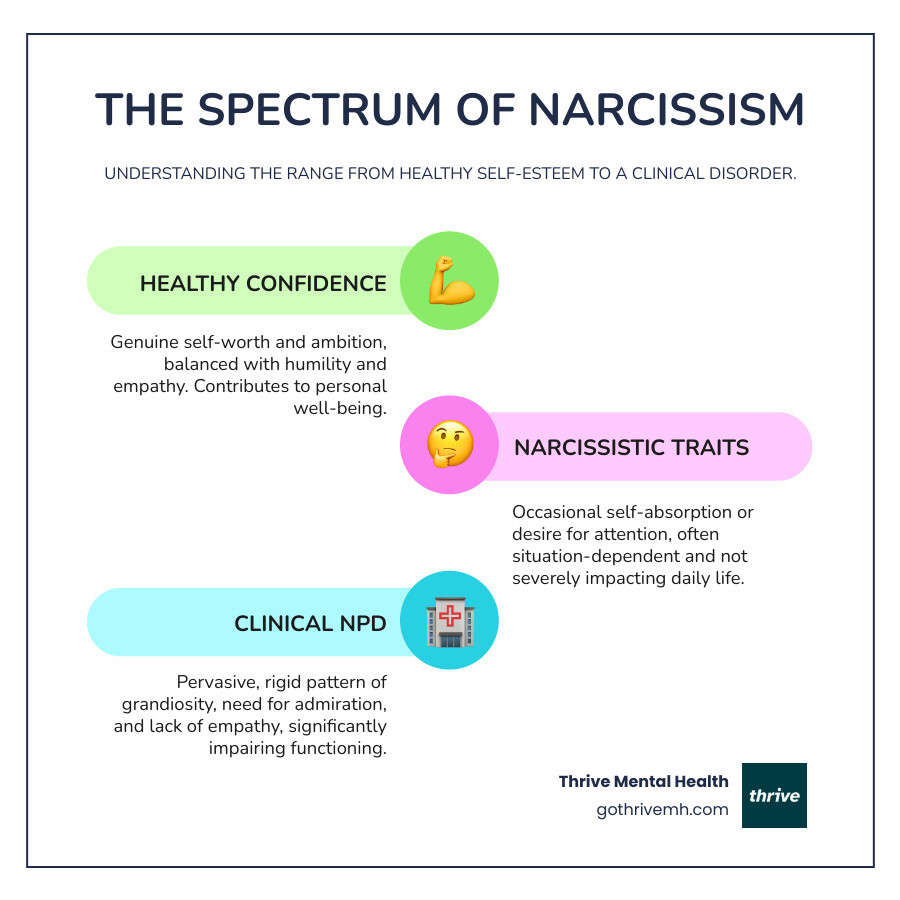12 Important Narcissist Traits You Didn’t Learn in School

What Are the 12 Traits of a Narcissist? Crucial Insights
Understanding Narcissism: More Than Just Self-Love
What Are the 12 Traits of a Narcissist? The 12 key traits include:
- Grandiose sense of self-importance
- Constant need for excessive admiration
- Pervasive lack of empathy
- Strong sense of entitlement
- Manipulative and exploitative behavior
- Arrogant, haughty attitude
- Preoccupation with fantasies of success
- Fragile self-esteem
- Chronic envy
- Disregard for boundaries
- Superficial relationships
- Excessive need for control
The term “narcissism” originates from the myth of Narcissus, but today it describes a spectrum of behaviors, from healthy self-confidence to a clinical diagnosis of Narcissistic Personality Disorder (NPD).
Displaying some of these traits occasionally doesn’t mean someone has NPD. A diagnosis is considered only when these behaviors are pervasive, chronic, and significantly impair daily functioning and relationships. A formal diagnosis requires a clinical assessment based on at least five of nine specific criteria in the DSM-5.
Recognizing these traits is the first step toward protecting your mental health and fostering healthier connections. This guide will help you identify these behaviors and understand when it’s time to seek support.

Narcissism vs. NPD: When Do Traits Become a Disorder?
While it’s common to label a self-centered person a “narcissist,” it’s crucial to distinguish between having narcissistic traits and having Narcissistic Personality Disorder (NPD). This distinction helps determine when professional support is necessary.
Narcissism is a personality trait everyone possesses to some degree. In healthy amounts, it fuels ambition and self-confidence. However, NPD is a clinical diagnosis defined in the DSM-5 diagnostic criteria for NPD. It involves a pervasive pattern of grandiosity, a constant need for admiration, and a profound lack of empathy.
Traits become a disorder based on three factors: severity, chronicity, and impact on daily functioning. Someone with narcissistic traits might act self-centered occasionally. In contrast, a person with NPD exhibits these behaviors consistently across all areas of life, causing significant impairment to their relationships and ability to function.
Their relationships are often shallow and volatile, and they may struggle with feedback at work, leading to a cycle of unstable jobs and friendships. A formal diagnosis requires a thorough clinical assessment by a mental health professional and cannot be determined from an article. Recognizing when these behaviors become destructive is the first step toward seeking help and promoting healing.
What Are the 12 Traits of a Narcissist?
Now that we understand the distinction between narcissistic traits and NPD, let’s explore what are the 12 traits of a narcissist that often manifest in individuals exhibiting these patterns. These behaviors can be subtle or overt, but breaking them down can help you protect your well-being.

This section explains the core behaviors associated with narcissism, helping you identify them in others or yourself. Understanding how these patterns show up in real life is key.
1. Grandiose Sense of Self-Importance
A grandiose sense of self-importance is the core belief that one is superior to others. People with this trait exaggerate their achievements and talents, expecting to be recognized as exceptional. In relationships, this manifests as talking down to partners and ensuring their own needs always take precedence.
2. Constant Need for Excessive Admiration
A constant need for excessive admiration is an insatiable hunger for external validation, often called “narcissistic supply.” Their fragile ego depends on a steady stream of praise. They may monopolize conversations or fish for compliments, becoming angry or withdrawn when this need isn’t met.
3. Pervasive Lack of Empathy
A pervasive lack of empathy is an inability to genuinely recognize or identify with the feelings of others. This results in cold, dismissive reactions to others’ suffering. In relationships, they may invalidate a partner’s feelings, show no remorse for causing pain, and even exploit vulnerabilities.
4. Strong Sense of Entitlement
A strong sense of entitlement is the unreasonable expectation of especially favorable treatment. They believe they deserve the best without earning it and that rules don’t apply to them. This leads to disproportionate anger when their needs aren’t met immediately, as they view others as existing to serve them.
5. Manipulative and Exploitative Behavior
Individuals with narcissistic traits are often masters of manipulation, using others to achieve their own ends without remorse. Manipulative and exploitative behavior includes tactics like gaslighting, where a victim is made to question their own sanity. For more on how this can escalate, explore reactive abuse and its signs.
6. Arrogant, Haughty, or Superior Attitude
Beyond just believing they are superior, they display arrogant, haughty, or superior attitudes through condescending behavior. They adopt a patronizing tone and belittle others’ opinions. In relationships, this manifests as constant criticism that chips away at a partner’s self-esteem.
7. Preoccupation with Fantasies of Unlimited Success
Narcissists often escape reality through a preoccupation with fantasies of unlimited success, power, or ideal love. These fantasies serve as a shield against feelings of emptiness. In relationships, they hold partners to impossible, idealized standards and devalue them when they inevitably fall short.
8. Fragile Self-Esteem and Difficulty with Criticism
Despite outward confidence, narcissists have a deeply fragile self-esteem and are hypersensitive to criticism. Any feedback can be perceived as a personal attack, known as a “narcissistic injury.” This difficulty with criticism leads them to lash out with rage or become defensive rather than acknowledge any fault.
9. Chronic Envy and Belief Others Envy Them
Narcissists often experience intense chronic envy, resenting the success of others. Simultaneously, they believe others are equally envious of them. In relationships, they may sabotage a partner’s success or minimize their accomplishments to maintain their own sense of superiority.
10. Disregard for Other People’s Boundaries
A disregard for other people’s boundaries means they consistently overstep physical, emotional, and personal limits. They may read private messages, show up unannounced, or pressure a partner into actions they’re uncomfortable with. When a boundary is asserted, they often react with offense.
11. A Pattern of Superficial or Unstable Relationships
Narcissists struggle with long-term, meaningful connections, leading to a pattern of superficial or unstable relationships. Their relationships are often transactional and follow an “idealization-devaluation-discard” cycle. Early life experiences, such as the impact of a narcissistic mother, can shape these patterns.
12. An Excessive Need for Control
An excessive need for control stems from deep-seated insecurities. This manifests as dominating conversations, micromanaging family members, and using intimidation to maintain power. In relationships, this can involve financial control or isolating a partner from their support system, leaving them feeling trapped.
The Two Faces of Narcissism: Grandiose vs. Vulnerable
Narcissism isn’t always loud and boastful; it can also be quiet and insecure. Understanding its two primary forms—grandiose and vulnerable—is key to recognizing the behavior.

Grandiose narcissism is the stereotypical presentation: arrogant, extroverted, and attention-seeking. These individuals openly boast, believe they are superior, and react to criticism with rage or dismissal. They appear invulnerable, though their confidence is built on a fragile foundation.
Vulnerable narcissism is more subtle. These individuals appear insecure, introverted, and may even seem self-deprecating. They seek validation not through boasting, but through victimhood, constantly sharing stories of being wronged or misunderstood. Instead of exploding when criticized, they become withdrawn, sulk, or use passive-aggressive tactics and guilt-tripping.
Despite their differences, both types share a fragile self-esteem, a need for validation, and a lack of empathy. The grandiose type seeks admiration, while the vulnerable type seeks sympathy. Both can be equally draining and damaging to relationships.
Protecting Your Peace: How to Deal with a Narcissist
Knowing what are the 12 traits of a narcissist is the first step; learning how to respond is crucial for your well-being. Dealing with narcissistic behavior is exhausting, but you can protect your peace with strategic effort. You can’t change them, but you can change your response.

Here are actionable strategies for navigating these challenging relationships.
Set and Enforce Firm Boundaries
This is the most vital step. Narcissists disregard boundaries, so you must define what is unacceptable, communicate it calmly, and enforce consequences consistently. For example, instead of “You always interrupt me,” say, “I need to finish my thought.” If they continue, end the conversation. The “Grey Rock Method”—becoming emotionally unresponsive and uninteresting—is also effective.
Manage Your Emotional Responses
Narcissists feed on emotional reactions. Learning to respond instead of react protects your energy. Stay calm and objective, and avoid emotional arguments. Remember JADE: Don’t Justify, Argue, Defend, or Explain. State your truth and disengage. If you find yourself constantly trying to appease them, you may be using a fawning trauma response. Learning to break free from fawning responses is an empowering step.
Build a Strong Support System
Narcissists often isolate their victims. Counteract this by connecting with trusted friends, family, or a support group. Sharing your experiences with people who validate your feelings is essential. Seeking professional support from a therapist who understands narcissistic abuse can provide you with coping mechanisms and strategies. This external validation reminds you that your perceptions are real.
Finding Support and Starting the Healing Process
Recognizing what are the 12 traits of a narcissist is the start of a healing journey. The impact of these relationships on mental health can be profound, leading to anxiety, depression, and trauma. Healing is possible, and you deserve support.
For individuals with narcissistic traits, change is difficult but not impossible with long-term professional help, as research suggests. Therapies like Cognitive Behavioral Therapy (CBT) and Dialectical Behavioral Therapy (DBT) can help challenge distorted thinking and build empathy, but require genuine commitment.
If you are dealing with narcissistic behavior, therapy is vital. It provides a safe space to process your experiences, rebuild self-esteem, and learn to set firm boundaries. Understanding the overlap between narcissism and other conditions can also be helpful; learn more by exploring the intersection of mental illness and narcissism.
At Thrive Mental Health, we understand these challenges. Our flexible care is designed for adults and young professionals in Florida, as well as virtually. We offer intensive outpatient (IOP) and partial hospitalization (PHP) programs that fit into your life. We work with major insurance providers like Cigna, Optum, and Florida Blue to make care accessible. Our team uses evidence-based therapies to help you process trauma and build healthier relationships.
Reaching out for support is a sign of courage. With the right help, healing is achievable.
Frequently Asked Questions about the 12 Traits of a Narcissist
Understanding what are the 12 traits of a narcissist often brings up more questions. Here are answers to some common concerns.
Can a person with narcissistic traits change?
Change is possible but extremely difficult. It requires a genuine commitment to long-term professional help, such as Cognitive Behavioral Therapy (CBT). The primary obstacle is that narcissism makes it hard to recognize one’s own faults, which is a necessary first step for change. It’s important to protect yourself rather than wait for someone else to change.
What is the difference between narcissism and high self-confidence?
High self-confidence is based on genuine self-worth and is paired with empathy. Confident people can admit weaknesses and lift others up. Narcissism, however, is based on a fragile ego that needs constant external validation. It involves a lack of empathy and a tendency to put others down to feel superior.
What is it like to be raised by a narcissistic parent?
Being raised by a narcissistic parent can cause lasting emotional challenges, including low self-esteem, anxiety, and difficulty in relationships. Children often feel they exist only to serve the parent’s needs, leading to a persistent feeling of not being good enough. They may learn to be people-pleasers and struggle with setting boundaries. With professional support, healing from abandonment trauma caused by a narcissistic parent is possible.
Ready for Support?
If you’ve made it this far, you’ve taken an important step in understanding what are the 12 traits of a narcissist and how they impact relationships. Whether you’re recognizing these patterns in someone close to you, navigating a difficult relationship right now, or even questioning some of your own behaviors, know that you’re not alone in this journey.
Here’s what matters most: Recognizing these traits is powerful, but it’s only the beginning. Protecting your mental health and fostering healthier relationships requires ongoing support, whether that means learning to set firmer boundaries, processing past trauma, or seeking help for yourself or a loved one.
At Thrive Mental Health, we understand how exhausting and isolating it can feel to deal with narcissistic behavior. Our virtual and hybrid intensive outpatient (IOP) and partial hospitalization (PHP) programs are designed specifically for adults and young professionals who need flexible, evidence-based care that fits into their lives. We offer evening options because we know healing doesn’t happen on a 9-to-5 schedule.
We work with major insurance providers including Cigna, Optum, and Florida Blue, making quality mental health care accessible whether you’re in Florida, or connecting with us virtually from anywhere. Our expert clinicians use proven therapies like CBT, DBT, and EMDR to help you process complex emotions, develop healthier relationship patterns, and reclaim your sense of self.
Ready to take the next step? Verify your insurance in just 2 minutes—there’s no obligation, and you’ll know exactly what’s covered. You can also call us directly at 561-203-6085 to speak with someone who understands.
If you’re in crisis right now, please call or text 988 immediately. You deserve support, and help is available 24/7.
Healing is possible. You don’t have to steer this alone.